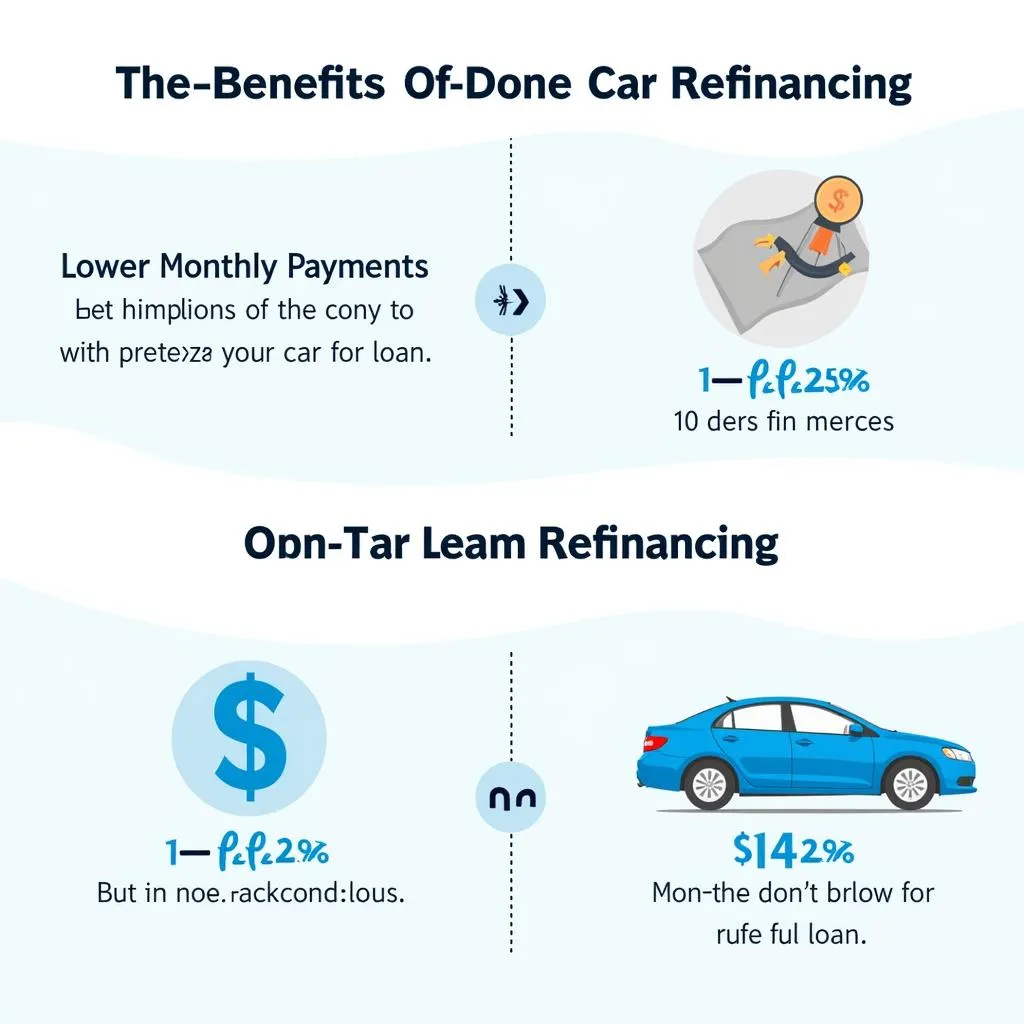Car refinancing involves replacing your existing auto loan with a new one, potentially with a lower interest rate, different loan term, or both. This can save you money on monthly payments and over the life of your loan. If you’re looking to reduce your car expenses or tap into your vehicle’s equity, car refinancing could be a strategic move.
Understanding Car Refinance and Its Benefits
Car refinancing is essentially taking out a new loan to pay off your old one. It’s similar to refinancing a mortgage. Your new loan comes with a new interest rate and loan term, impacting your monthly payments and the total interest paid over time.
 Benefits of Refinancing Your Car Loan
Benefits of Refinancing Your Car Loan
Reasons to Consider Refinancing Your Car Loan:
- Lower Interest Rates: Securing a lower interest rate is a primary motivator for car refinancing. Even a slight reduction can lead to significant savings.
- Reduced Monthly Payments: Refinancing can lower your monthly payments by extending the loan term or securing a lower interest rate.
- Access to Equity: If your car has appreciated in value, refinancing can help you access that equity, which you can use for other financial goals.
The Car Refinance Process: A Step-by-Step Guide
Refinancing your car loan is a relatively straightforward process:
- Check Your Credit Score: Lenders use your credit score to determine your creditworthiness and offer you interest rates accordingly. Before you apply, check your credit report for any errors and work on improving your score if needed.
- Research Lenders: Compare rates and terms from different lenders, including banks, credit unions, and online lenders.
- Choose Your Loan: Select the lender that offers the most favorable terms and conditions for your financial situation.
- Complete the Application: Fill out a loan application with the chosen lender, providing all the necessary documentation.
- Finalize the Refinancing: Once approved, finalize the loan documents and allow your new lender to pay off your old loan.
When to Consider Car Refinancing
- Interest Rates Have Dropped: If interest rates have decreased since you took out your initial loan, refinancing can help you secure a lower rate.
- Your Credit Score Has Improved: A better credit score often qualifies you for lower interest rates.
- You Need Lower Monthly Payments: Refinancing to a longer loan term can reduce your monthly payments.
Factors Affecting Your Car Refinance Rate
- Credit Score: A higher credit score generally translates to lower interest rates.
- Loan Term: Shorter loan terms often have lower interest rates but higher monthly payments.
- Vehicle Age and Mileage: Lenders consider the age and condition of your vehicle when determining rates.
- Debt-to-Income Ratio (DTI): Lenders assess your DTI, which is the percentage of your gross monthly income that goes towards debt payments, to assess your ability to repay the loan.
 Using a Car Refinance Calculator
Using a Car Refinance Calculator
Tips for a Successful Car Refinance
- Shop Around for the Best Rates: Get quotes from multiple lenders to compare interest rates and terms.
- Read the Fine Print: Before signing any documents, carefully review the loan agreement, including fees, prepayment penalties, and other terms.
- Consider Your Long-Term Financial Goals: While refinancing can lower monthly payments, extending the loan term can lead to paying more interest over time.
Conclusion
Car refinancing can be a smart financial move to potentially save money, lower monthly payments, and access your vehicle’s equity. By carefully considering your financial situation, comparing loan options, and following a strategic approach, you can make an informed decision about whether car refinancing is right for you. If you’re looking for ways to optimize your car ownership experience, explore resources like sale cars near me or used car for sale near me on DiagXcar for valuable insights and options.


